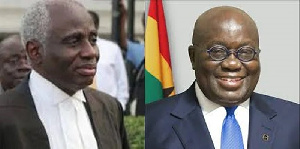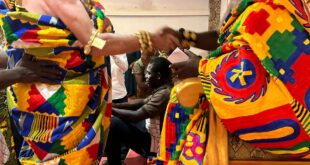President Nana Addo Dankwa Akufo-Addo and the legal luminary, Tsatsu Tsikata, may belong to different political ideologies when it comes to certain matters of constitutionality and principle, however, they have on few rare occasions been on the same side.
One of such rare cases was in 1979 when they both represented Dr Kwame Tuffour in the landmark ‘Tuffuor v Attorney-General’ case.
Background
Chief Justice Fred Kwasi Apaloo had been nominated by the then-president to continue his role as the head of the judiciary arm of government.
His nomination was however subjected to parliamentary vetting which per reports was a tactic to have him removed from office using parliament.
This move by the government, according to Paul Adom-Otchere, who recounted the story on his show, was in contravention of the 1979 transitional process of 1979 which stated that “any judge who was with the Superior court of judicature will continue under the constitution as a judge as if he was appointed under the constitution”.
This statement meant that judges of the higher courts were going to hold on to their positions they held prior to the arrival of the 1979 constitution.
Chief Justice Apaloo however went for vetting and was rejected by parliament.
Dr Kwame Tuffour sues Attorney General
Dr Kwame Tuffour who was a lecturer at the Kwame Nkrumah University of Science and Technology sued the state at the Supreme Court to seek an interpretation of the law.
Pursuing Dr Kwame Tuffour’s case were lawyers Nana Addo Dankwa Akufo-Addo, Tsatsu Tsikata and Dr Edmund Prempeh.
The state was represented by Chief Justice Joe Reindorf and his deputy A.L Djabatey.
The argument of Dr Kwame Tuffuor was that the Parliament had no right to vet Chief Justice Apaloo, talk less of declaring him ineligible to continue with his role as Chief Justice.
Court ruling
The court per Adom-Otchere’s narrative and other publications on the matter ruled that Parliament’s conduct was an affront to the 1979 constitution.
In the view of the court, “the Chief Justice in both constitutions presided over all courts within the superior court of judicature. He was the president and member of all those courts not by reason of a direct or specific appointment to any of them but by virtue of his status as the head of the superior court of judicature.”
The court continued: “…True, the institution during the decade before the present constitution lost one of its departments, but was not dismembered; it remained intact and remained as one superior court of judicature.”
The court in its ruling, according to Adom-Otchere showed that the Supreme Court in certain cases had jurisdiction over Parliament and could therefore rule on certain matters.
Justice Apaloo was cleared and went on to hold the position of Chief Justice until his eventual retirement in 1986.
Source: www.ghanaweb.com
 Home Of Ghana News Ghana News, Entertainment And More
Home Of Ghana News Ghana News, Entertainment And More





